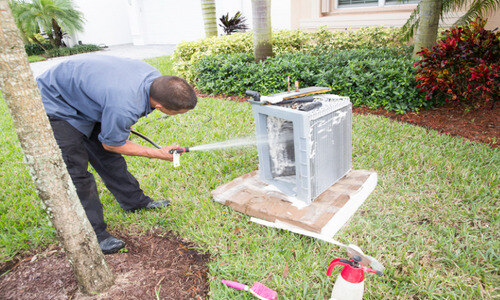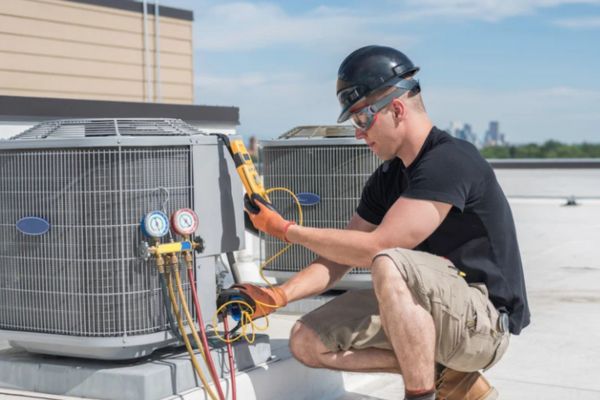The compressor in your central air conditioning system plays a critical role in keeping your home cool. It compresses the refrigerant, which absorbs and releases heat as it circulates through the system. This process cools the air that is pushed into your home. Without a functioning compressor, your system can’t adequately cool the air.
Signs that your compressor may be failing include:
- Unusual noises: Clanking, rattling, or hissing sounds.
- Reduced cooling: Air is not as cold as it should be.
- Tripped breakers: Electrical issues could be due to a failing compressor.

Common Reasons for Compressor Failure
Several factors can cause your compressor to stop working. Some common reasons include:
- Lack of maintenance: Skipping regular maintenance tasks, such as cleaning filters, can overwork the compressor.
- Electrical issues: Faulty wiring or other electrical malfunctions can cause compressor damage.
- Overheating: Running the system in extreme heat for long periods can overheat the compressor.
- Refrigerant problems: Low refrigerant levels can strain the compressor.
- Age and wear and tear: Air compressors naturally wear out over time, especially after 10-15 years of use.
Common Signs That Your AC Compressor Needs Replacement
Is your air conditioner’s compressor on its last legs? Look out for these common warning signs:
- Warm Air from Vents: If your AC is running but the air blowing out isn’t cool, it could mean the compressor is struggling to circulate refrigerant effectively.
- Frequent Circuit Breaker Trips: If your circuit breaker tripped often, the compressor might be overloading or short-circuiting, signaling an electrical problem needing immediate attention.
- Strange Noises: Rattling, grinding, or hissing noises from the outdoor unit can indicate internal damage to the compressor.
- Low Airflow and Poor Cooling: If your AC is having trouble maintaining the proper temperature or airflow is noticeably weak, a failing compressor could be the reason.
- Age: Your air conditioner is over 10-15 years old.
The cost of repairing or replacing other components is high. Replacing the whole system can cost between $3,000 and $7,000, but it may save you money in the long run through improved energy efficiency.
Factors Influencing Compressor Replacement Costs
If your compressor has failed, replacing it can be costly. Here are the factors that affect the price:
- Size and capacity of your air conditioning unit: Larger systems typically require more powerful compressors, which are more expensive.
- Brand and quality of the compressor: High-end brands tend to have more reliable (and pricier) compressors.
- Labor costs: Rates for professional HVAC services can vary by region. You may also face higher fees during peak summer months.
- Repair or complete replacement: Sometimes, a compressor can be repaired instead of replaced, lowering the cost.
- Warranty coverage: Check your warranty. You may only need to cover labor costs if your compressor is still under warranty.
Replacing a central air conditioner compressor costs between $1,200 and $2,800, including labor. Here’s a general breakdown:
- Low-end: $800 to $1,200 for smaller systems or lower-cost models.
- Mid-range: $1,200 to $2,000 for standard units.
- High-end: $2,500 to $3,000 for larger or high-efficiency systems.
Remember that costs vary depending on the brand, model, and region.
Ways to Save on Compressor Replacement
Replacing a compressor is a big investment, but there are ways you can reduce the cost:
- Maintain your system: Regular maintenance, like cleaning filters and scheduling annual tune-ups, can prolong the life of your compressor.
- Check your warranty: If your system is still under warranty, you may only need to cover the labor costs.
- Financing and rebates: Some HVAC companies offer financing options, or you may be eligible for rebates through energy-saving programs.
Repair or Replacement: Which is the Practical Choice?
Deciding between repairing or replacing your AC compressor depends on a few key factors, including the age of your system, whether it’s still under warranty, and the overall cost-effectiveness of the repair. Here’s how you can weigh your options:
- Age of the System: If your air conditioner is over ten years old, replacing the entire unit might be a better long-term investment. Newer systems are often more energy-efficient and can provide savings in utility bills.
- Repair Cost: If the repair cost is more than 50% of what a new unit would cost, investing in a new air conditioner is more practical, especially if other components are also aging.
- Warranty Status: Check if your compressor is still under warranty. If it is, a repair may be more cost-effective as some or all replacement costs could be covered.
8 Effective Tips to Reduce AC Compressor Costs
Reducing the chances of your compressor failing prematurely can save you money in the long run. Here are a few ways to maintain your AC unit and keep costs down:
- Schedule regular maintenance: Have a professional service your AC annually to keep it running smoothly.
- Change filters regularly: Clean or replace your AC filter every three months to ensure optimal airflow.
- Use your AC wisely: Limit AC usage during milder days or when no one is home.
- Seal air leaks: Prevent cool air from escaping by sealing windows and doors, reducing the workload on your system.
- Install a programmable thermostat: Automatically control your home’s temperature for maximum efficiency.
- Keep your outdoor unit clear: Make sure the area around your outdoor unit is free of debris to promote proper ventilation.
- Adjust your thermostat settings: Raise the temperature slightly when you’re not home to reduce strain on the system.
- Use fans for cooling: Ceiling fans and portable fans can help circulate cool air, allowing you to rely less on your AC
Conclusion
Being proactive about maintenance and repair costs can help you extend the life of your AC system and reduce the need for significant repairs or replacements. Consult a qualified HVAC technician to determine your system’s best course of action. Home Star is your top directory for connecting with trusted HVAC professionals who can guide you through installation, repair, and maintenance for your HVAC needs.


